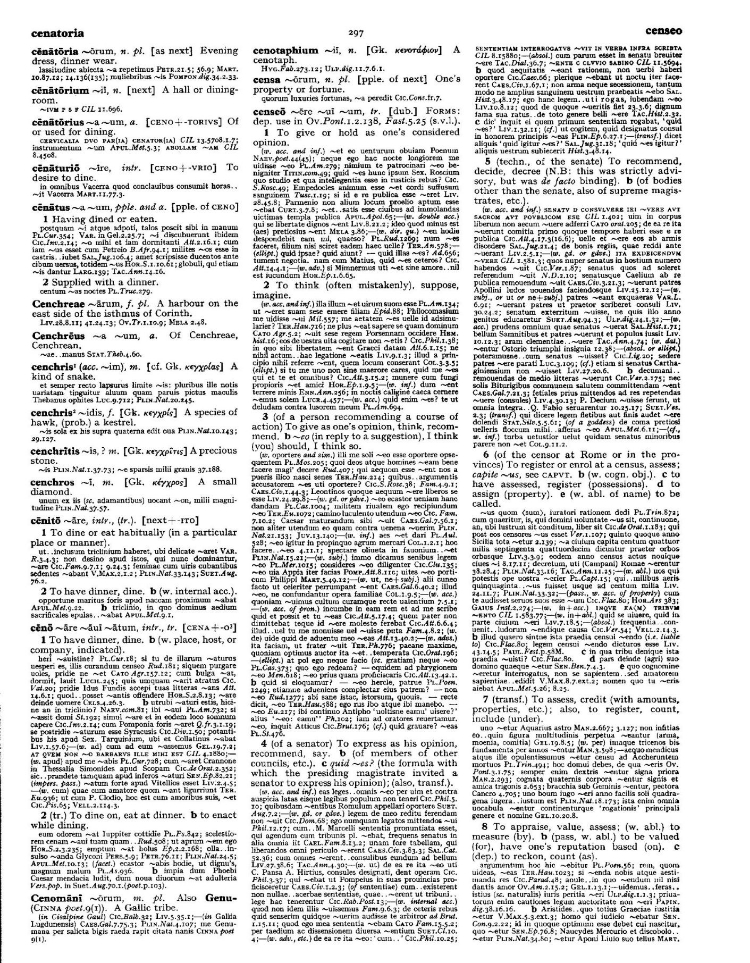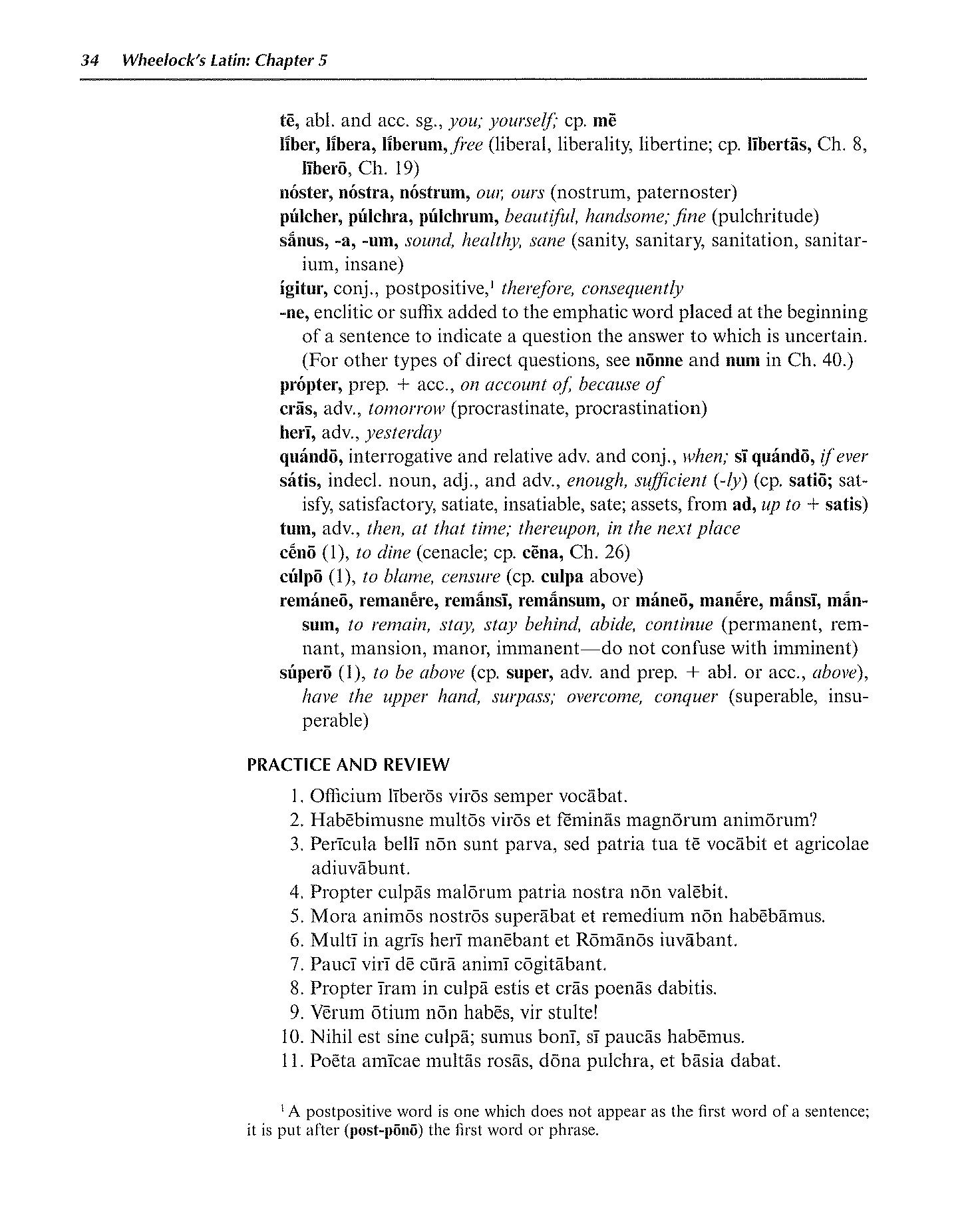
page_listing.tpl
page_subListingDetails.tpl
sub_listingDetails_style1.tpl
sub_listingDetails.title.tpl
cēnāre to dine
cēnāre is a Latin Verb that primarily means to dine.
Definitions for cēnāre
Wheelock's Latin
Verb
- 1
to dine
English derivatives:
cenacle
Oxford Latin Dictionary
Verb
- 1
To have dinner, dine. (b) (w. place, host, or company, indicated).
- 2
(tr.) To dine on, eat at dinner. (b) to enact while dining.
Sentences with cēnāre
Latin to English
Aurelia non cēnāvit.Compare Aurelia did not eat dinner.
Vōbīs licet hīc cēnāre.Compare You are allowed to dine here.
Nōnne cēnāre vultis?Compare Surely you want to eat, don't you?
Conjugation table for cēnāre
Cactus2000
| ACTIVE | |
| Indicative present | Indicative imperfect |
| cēnō cēnās cēnat cēnāmus cēnātis cēnant | cēnābam cēnābās cēnābat cēnābāmus cēnābātis cēnābant |
| Indicative perfect | Indicative pluperfect |
| cēnāvī cēnāvistī cēnāvit cēnāvimus cēnāvistis cēnāvērunt / cēnāvēre | cēnāveram cēnāverās cēnāverat cēnāverāmus cēnāverātis cēnāverant |
| Indicative future | Indicative future perfect |
| cēnābō cēnābis cēnābit cēnābimus cēnābitis cēnābunt | cēnāverō cēnāveris cēnāverit cēnāverimus cēnāveritis cēnāverint |
| Subjunctive present | Subjunctive imperfect |
| cēnem cēnēs cēnet cēnēmus cēnētis cēnent | cēnārem cēnārēs cēnāret cēnārēmus cēnārētis cēnārent |
| Subjunctive perfect | Subjunctive pluperfect |
| cēnāverim cēnāveris cēnāverit cēnāverimus cēnāveritis cēnāverint | cēnāvissem cēnāvissēs cēnāvisset cēnāvissēmus cēnāvissētis cēnāvissent |
Infinitive present cēnāre Infinitive perfect cēnāvisse Infinitive future cēnātūrum esse | Imperative present cēnā cēnāte Imperative future cēnātō cēnātō cēnātōte cēnantō |
| PASSIVE | |
| Indicative present | Indicative imperfect |
| cēnor cēnāris cēnātur cēnāmur cēnāminī cēnantur | cēnābar cēnābāris / cēnābāre cēnābātur cēnābāmur cēnābāminī cēnābantur |
| Indicative perfect | Indicative pluperfect |
| cēnātus sum cēnātus es cēnātus est cēnātī sumus cēnātī estis cēnātī sunt | cēnātus eram cēnātus erās cēnātus erat cēnātī erāmus cēnātī erātis cēnātī erant |
| Indicative future | Indicative future perfect |
| cēnābor cēnāberis / cēnābere cēnābitur cēnābimur cēnābiminī cēnābuntur | cēnātus erō cēnātus eris cēnātus erit cēnātī erimus cēnātī eritis cēnātī erunt |
| Subjunctive present | Subjunctive imperfect |
| cēner cēnēris / cēnēre cēnētur cēnēmur cēnēminī cēnentur | cēnārer cēnārēris / cēnārēre cēnārētur cēnārēmur cēnārēminī cēnārentur |
| Subjunctive perfect | Subjunctive pluperfect |
| cēnātus sim cēnātus sīs cēnātus sit cēnātī sīmus cēnātī sītis cēnātī sint | cēnātus essem cēnātus essēs cēnātus esset cēnātī essēmus cēnātī essētis cēnātī essent |
Infinitive present cēnārī Infinitive perfect cēnātum esse Infinitive future cēnātum īrī | Imperative present cēnāre cēnāminī Imperative future cēnātor cēnātor - cēnāntor |
| PARTICIPLE | ||
| Participle present active | ||
| Nom. | cēnāns | cēnantēs |
| Gen. | cēnantis | cēnantium |
| Dat. | cēnantī | cēnantibus |
| Acc. | cēnantem | cēnantēs |
| Abl. | cēnante | cēnantibus |
| Participle future active | ||
| Nom. | cēnātūrus | cēnātūrī |
| Gen. | cēnātūrī | cēnātūrōrum |
| Dat. | cēnātūrō | cēnātūrīs |
| Acc. | cēnātūrum | cēnātūrōs |
| Abl. | cēnātūrō | cēnātūrīs |
| Participle perfect passive | ||
| Nom. | cēnātus | cēnātī |
| Gen. | cēnātī | cēnātōrum |
| Dat. | cēnātō | cēnātīs |
| Acc. | cēnātum | cēnātōs |
| Abl. | cēnātō | cēnātīs |
| Gerundive | ||
| Nom. | cēnandus | cēnandī |
| Gen. | cēnandī | cēnandōrum |
| Dat. | cēnandō | cēnandīs |
| Acc. | cēnandum | cēnandōs |
| Abl. | cēnandō | cēnandīs |
| Gerund | Supine | |
| Nom. | cēnāre | cēnātum |
| Gen. | cēnandī | cēnātū |
| Dat. | cēnandō | |
| Acc. | cēnandum | |
| Abl. | cēnandō | |
Data sources
Notes
- Definitions
- Frederick M. Wheelock, Wheelock's Latin, 6th ed., rev. Richard A. LaFleur (New York, NY: HarperCollins Publishers, 2005): 34.
- P. G. W. Glare, Oxford Latin Dictionary, Vols. 1-8 (Oxford: Clarendon Press, 1982): 297.
- Word frequencies
- Paul B. Diederich, The Frequency of Latin Words and Their Endings, PhD diss., (Columbia University, 1939).
Bibliography
Allen, Joseph H. Allen and Greenough's New Latin Grammar for Schools and Colleges: Founded on Comparative Grammar. Edited by James B. Greenough, George L. Kittredge, Albert A. Howard, and Benjamin L. D'Ooge. Boston, MA: Ginn & Company, 1903.
Crystal, David. A Dictionary of Linguistics and Phonetics. 6th ed. Oxford, UK: Blackwell Publishing, 2008.
Delatte, Louis, Suzanne Govaerts, Joseph Denooz, and Etienne Evrard. Dictionnaire fréquentiel et index inverse de la langue latine [Frequency Dictionary and Inverse Index of the Latin Language]. Liège, Belgium: Laboratoire d'analyse statistique des langues anciennes de l'Université de Liège (L.A.S.L.A.), 1981.
Diederich, Paul B. The Frequency of Latin Words and Their Endings. PhD diss., Columbia University, 1939.
Francese, Christopher. "Latin Core Vocabulary." Dickinson College Commentaries. Last modified 2014. http://dcc.dickinson.edu/latin-vocabulary-list.
Gildersleeve, Basil L., and Gonzales Lodge. Gildersleeve's Latin Grammar: Third Edition, Revised, and Enlarged. 3rd ed. London, England: Macmillan and Co., 1903.
Glare, Peter G.W. Oxford Latin Dictionary. Vols. 1-8. Oxford, England: Clarendon Press, 1982.
Krüger, Bernd. "Latin Conjugation Tables." Cactus2000. Accessed May 5, 2023. https://latin.cactus2000.de/index.en.php.
Pierson, Nick. "Sound of Text." Accessed October 26, 2019. https://soundoftext.com.
Wheelock, Frederick M. Wheelock's Latin. 6th ed. Revised by Richard A. LaFleur. New York, NY: HarperCollins Publishers, 2005.
Wiktionary Contributors. "Victionarium." Wikimedia Foundation, Inc. Updated March 18, 2019. https://la.wiktionary.org/wiki/Victionarium:Pagina_prima.
Citation
Chicago (17th ed.)
Allo Contributors. "cēnō, cēnāre, cēnāvī, cēnātum (v.) - Latin Word Definition." Allo Latin Dictionary. Last modified . Accessed January 30, 2026. http://ancientlanguages.org/latin/dictionary/ceno-cenare-cenavi-cenatum.
Entry created on . Last updated on .







